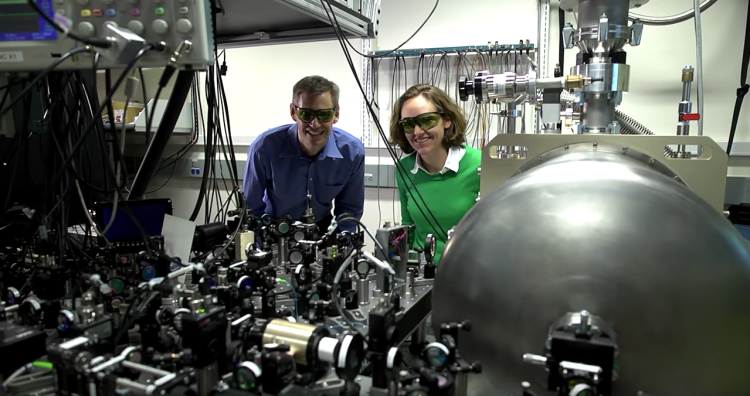Colorado labs had hefty economic impact in 2016

JILA physicists Konrad Lehnert (left) and Cindy Regal (right) study quantum mechanics involving such technologies as communications networks, computers and advanced sensors.
Federally-funded research facilities in Colorado contributed an estimated $2.6 billion to the state's economy in 2016 and supported more than 17,600 jobs, according to a new report from the Leeds School of Business.
The report—Economic and Fiscal Impacts of Federally Funded Research Facilities in Colorado, FY2013-FY2015—also shows how 33 federally-funded laboratories help make Colorado a national center for research and innovation.
"Colorado's federally-funded research labs fuel our innovation economy," Colorado Gov. John Hickenlooper said in a statement released by CO-LABS. "Their impact is far reaching, attributing to Colorado's high-quality talent pool and expanding into our startups and private industry. These labs help to ensure our state's future progress."
This is the fourth economic impact report produced by the Leeds School of Business for CO-LABS, Colorado Leveraging Assets for Better Science. Previous CO-LABS and Leeds economic impact studies were released in 2013, 2011 and 2008.
For the latest report, the Leeds School's Brian Lewandowski surveyed Colorado's 33 federally funded research laboratories, from the Crops Research Laboratory in Fort Collins to the National Oceanic and Atmospheric Administration in Boulder and the National Renewable Energy Laboratory in Golden. He collected detailed data on employees’ educational attainment, organizational budgets, spinoff companies, technology transfer and more.
The study also summarized the federal science funding landscape, drawing from national reports to highlight Colorado's top-tier ranking among states in funding from the U.S. Department of Commerce (second), Department of Interior (second), NASA (third), Environmental Protection Agency (fifth) and National Science Foundation (sixth).
Among Lewandowski's findings:
- The estimated economic impact of federally funded laboratories in Colorado in fiscal year 2015 was $2.6 billion; it was $2.5 billion in fiscal years 2013 and 2014.
- Colorado's federally funded labs directly employed nearly 7,800 people in FY 2015, and supported an additional 9,800 jobs through the multiplier effect (people employed by instrument makers, utility companies, etc.).
- In the latest year available, 2014, Colorado's scientists and research groups received funding support from many agencies, making the state one of the top in research funding from departments such as Commerce and Interior, and agencies such as NASA and the National Science Foundation.
- Colorado's federally funded scientists live in 30 of the state's 64 counties, with the highest number in Boulder, Larimer and Jefferson counties.
- Ten labs reported active commercialization programs, from tech transfer and licensed technology to spin-off companies and public-private partnerships with shared space or equipment.
"Colorado's federal research facilities conduct wide-ranging basic and applied research that results in scientific and 'commercializable' research advancements," said Brian Lewandowski, associate director of CU Boulder’s Business Research Division. "Beyond the research, these facilities play an important economic function in the Colorado economy, including employing a body of highly educated researchers and through the purchasing of goods and services within the Colorado economy."
A critical finding in the report is that federal investments in this state support a strong scientific and technical workforce. Of those employed in federal laboratories, 55 percent have master's or doctoral degrees, compared with 15 percent statewide; and Colorado ranks fourth among states for the percentage of the workforce engaged in science and engineering jobs.
That expertise has a strong effect on the state's powerful innovation economy. Highly educated and trained workers leave federal employment to form spinoff companies and others develop technologies based on discoveries and inventions coming out of the research laboratories. Many of the state’s federally funded research laboratories work within powerful partnerships that include industry and academia.
"We found that the labs add value in dollars, jobs and beyond," added Brian Payer, CO-LABS Board Chair and Program Manager of Strategic Operations for Sphera. "We learned about tremendous synergy between the laboratories, businesses and the community. The labs spur innovation through spin out companies, technology licensing, cooperative work agreements, and access for formal and informal conversations with world-class experts across an incredible breadth of disciplines. In addition, we learned that people want to live here, making it easier for the labs to recruit top-notch talent to the state."
Work conducted in Colorado’s federally funded research laboratories is also critical to protecting lives and property. A NOAA research group in Boulder, for example, works on weather modeling innovations that improve forecasting, especially for high-impact storms. These innovations give emergency managers and others better information, earlier.
That team developed the HRRR, or High-Resolution Rapid Refresh model, now used in the 122 National Weather Service offices around the country.
"NOAA's research efforts have been crucial to improving the forecasts of hazardous aviation weather, which impacts the safety and the efficiency of the National Airspace System," said the Federal Aviation Administration's Steve Abelman.
The FAA has long supported NOAA's weather research efforts, and the outcomes have included validation of turbulence, in-flight icing and thunderstorm forecasts now used operationally in the national airspace, according to Abelman. "Long-term research has led to new and improved weather prediction models such as the High Resolution Rapid Refresh, which is integrated into FAA decision-making every day," he said.
"The collective impact of the labs' research also ripples out to every state in the country," said Dan Powers, executive director of CO-LABS. "Ranging from partnership agreements to licensing of technology to outright free access to the research from these taxpayer-funded labs, thousands of companies throughout the United States representing hundreds of thousands of jobs utilize this science in ways that make us healthier, safer, more sustainable and global leaders in innovation."


